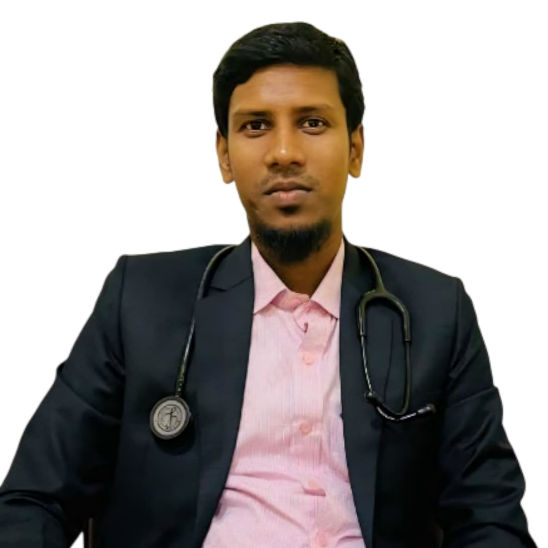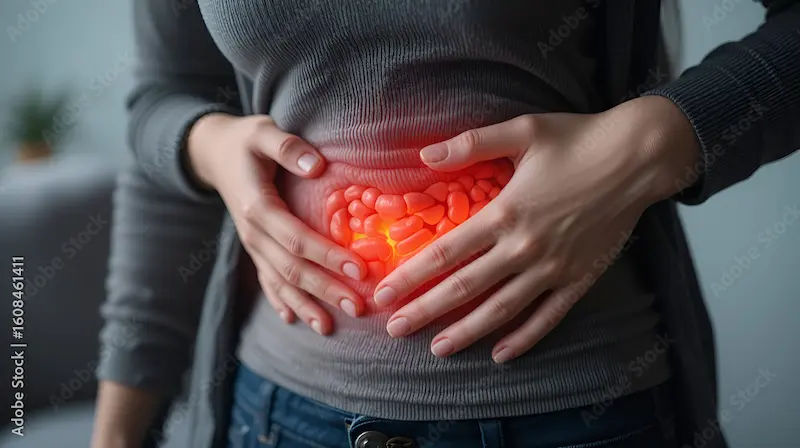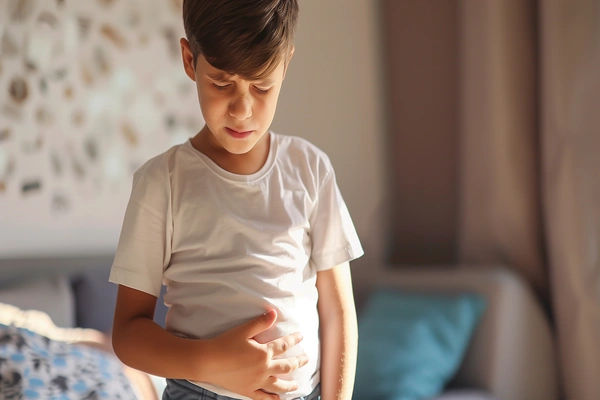A Parent's Guide to Recurrent Abdominal Pain in Children
Learn about recurrent abdominal pain in children, its causes, symptoms, diagnosis, and effective management strategies to support your child’s well-being.

Written by Dr. J T Hema Pratima
Reviewed by Dr. Dhankecha Mayank Dineshbhai MBBS
Last updated on 13th Jan, 2026

Introduction
Watching your child clutch their stomach in pain, especially when it happens again and again, is a deeply worrying experience for any parent. Recurrent abdominal pain is one of the most common reasons children are taken to see a doctor, affecting a significant number of school-aged kids. It’s defined as at least three episodes of pain over a period of three months, severe enough to disrupt their daily activities. This guide is designed to demystify this challenging condition. We’ll walk you through the potential causes—from the common functional abdominal pain to other medical issues—and provide you with a clear understanding of the symptoms, diagnosis process, and powerful management strategies you can use at home. Our goal is to equip you with knowledge and reassurance, helping you and your child navigate this journey with confidence.
What is Recurrent Abdominal Pain? Understanding the Basics
Recurrent abdominal pain (RAP) is not a single disease but a description of a pattern. It refers to at least three episodes of abdominal pain that occur over at least three months, and are severe enough to interfere with a child's normal activities like school, sports, or play. It's crucial to understand that in the vast majority of cases—over 90%—no serious underlying organic disease is found. This doesn't make the pain any less real for the child; it simply means the cause is often functional abdominal pain, a disruption in the way the gut and brain interact.
How Common is Stomach Pain in Kids?
This is an extremely prevalent issue. Studies suggest that up to 10-15% of all school-aged children experience recurrent abdominal pain severe enough to see a doctor. It peaks between the ages of 4 and 6 years and then again in early adolescence, around 9 to 12 years. Girls appear to be slightly more affected than boys as they enter their teenage years. Understanding its prevalence can be reassuring for parents; you are not alone in dealing with this frustrating and often confusing condition.
Recognising the Symptoms: More Than Just a Tummy Ache
The pain of RAP is typically located around the navel (periumbilical), but it can be hard for a child to pinpoint. It might be described as a dull ache, a cramp, or a sharp stab. Associated symptoms can include headache, pallor (pale skin), nausea, and occasionally vomiting. Importantly, the pain rarely wakes the child from sleep.
Common Characteristics of Functional Pain
Functional abdominal pain often has a distinct pattern. The pain is typically unrelated to eating, bowel movements, or physical activity. It might coincide with stressful events like school exams, family conflicts, or social anxieties. Parents might notice their child is a "worrier" or tends to be a perfectionist.
"Red Flag" Symptoms That Need Immediate Attention
While most cases are functional, certain symptoms warrant prompt medical evaluation to rule out serious organic causes. If your child's condition does not improve after trying dietary and stress-management methods, or if you see any of the following, consult a doctor online with Apollo24|7 for further evaluation:
- Pain that wakes the child from sleep.
- Persistent fever.
- Unexplained weight loss or slowed growth.
- Blood in the stool or vomit.
- Severe, persistent diarrhoea or vomiting.
- Pain located away from the belly button.
- Joint pain or skin rashes.
- A family history of inflammatory bowel disease (IBD) or coeliac disease.
Consult a Specialist for the best advice
Delving into the Causes: Why Does My Child's Stomach Hurt?
Understanding the causes helps in tailoring the right approach. The causes are broadly divided into two categories: functional and organic.
Functional Abdominal Pain: The Gut-Brain Connection
This is the most common cause. Think of it as a miscommunication between the brain and the digestive system. The gut's nerves become hypersensitive, interpreting normal digestive processes (like gas or normal contractions) as painful. It's not a structural problem but a functional one.
The Role of Stress and Anxiety
Stress is a massive trigger. School pressure, bullying, family problems, or even over-scheduling can manifest as physical pain. The brain sends stress signals to the gut, which can slow down or speed up digestion, increase acid production, and heighten pain perception. This creates a vicious cycle: pain causes anxiety, and anxiety causes more pain.
Organic Causes: Less Common but Important to Rule Out
These are tangible medical conditions that need to be identified and treated specifically.
Lactose Intolerance and Other Food Sensitivities
Lactose intolerance (inability to digest the sugar in milk) can cause bloating, gas, diarrhoea, and cramping. Other triggers can include high-fructose corn syrup, sorbitol, or sometimes gluten (in coeliac disease).
Constipation: A Frequent Culprit
This is a very common and often overlooked cause of chronic stomach aches in kids. Hard, infrequent stools can cause significant cramping and pain, often relieved after a bowel movement.
Other Medical Conditions (e.g., Coeliac Disease, IBD)
Less commonly, conditions like coeliac disease (an immune reaction to gluten), inflammatory bowel disease (like Crohn's or ulcerative colitis), or even abdominal migraines can be the cause. This is why a proper medical evaluation is essential.
How is Recurrent Abdominal Pain Diagnosed?
Diagnosis relies heavily on the "three-legged stool" of a good medical history, a physical exam, and judicious use of tests—often to rule things out rather than to find something.
The Importance of the Medical History and Symptom Diary
Your doctor will ask detailed questions. Keeping a "symptom diary" for 2-3 weeks is invaluable. Note the timing, location, and severity of pain, what the child ate, bowel habits, sleep quality, and any stressful events. This log can reveal powerful patterns.
The Physical Examination: What the Doctor Looks For
The doctor will examine your child's abdomen for tenderness, masses, or signs of enlargement of organs like the liver or spleen. They will also check your child's growth pattern on a percentile chart; stable growth is a strong indicator of a functional cause.
When Are Tests Necessary? Understanding the Process
If the history and exam suggest a functional cause and there are no red flags, extensive testing may not be needed. If red flags are present, tests might include blood tests (for anaemia, inflammation, coeliac disease), a stool test, a breath test for lactose intolerance or SIBO, or an ultrasound. Apollo24|7 offers convenient home collection for tests like CBC or CRP, making the process less stressful for your child.
Effective Management and Treatment Strategies
Treatment is multifaceted, focusing on empowerment and management rather than a simple "cure."
The Power of Reassurance: It's Not "All in Their Head"
The single most important step is validating your child's experience. Explain that their pain is real, but their belly is healthy and strong. This reduces the anxiety that fuels the pain cycle. Say, "Your tummy is just extra sensitive, and we can learn to calm it down together."
Dietary Modifications to Soothe the Gut
- The Fibre Balance: For constipation-related pain, increasing soluble fibre (e.g., oats, apples, bananas) with adequate water intake can help. For bloating, sometimes reducing high-gas foods (beans, cabbage, carbonated drinks) is useful.
- Identifying Trigger Foods: The symptom diary is key. If dairy seems to be a trigger, a trial of lactose-free diet might be recommended. A low FODMAP diet, while effective, should be guided by a dietitian.
Lifestyle and Stress-Reduction Techniques
- Mindfulness and Relaxation: Teach simple deep breathing exercises ("belly breathing") or use guided imagery apps designed for children. This gives them a tool to control their body's response to pain.
- The Role of Regular Physical Activity: Exercise is a fantastic stress reliever and helps regulate bowel function. Encourage daily play, sports, or family walks.
When Medication Might Be Considered
Medication is rarely the first line of defence. In some cases, a doctor might recommend a probiotic, peppermint oil capsules (for antispasmodic effects), or, for severe cases, a low-dose antidepressant that works on the gut's nerve pathways, not for depression.
Conclusion
Navigating your child's recurrent abdominal pain can feel like a maze, but with the right map, you can find your way through. Remember, the goal is often management and empowerment, not an instant cure. By understanding the functional nature of most cases, you can shift the focus from searching for a disease to implementing effective strategies that soothe both the gut and the mind. Your calm reassurance is the most powerful medicine you can offer. Keep the lines of communication open with your child and their doctor, and trust that with patience, support, and the practical steps outlined in this guide, your child can overcome this challenge and return to a happy, pain-free childhood. If you ever feel unsure or notice any alarming signs, never hesitate to seek professional guidance.
Consult a Specialist for the best advice
Consult a Specialist for the best advice

Dr. Mainak Baksi
General Practitioner
13 Years • MBBS , MD (MPH)
Howrah
Mainak Baksi Clinic, Howrah
(50+ Patients)

Dr. Rajib Ghose
General Physician/ Internal Medicine Specialist
25 Years • MBBS
East Midnapore
VIVEKANANDA SEBA SADAN, East Midnapore

Dr. Moumita Roy
General Physician/ Internal Medicine Specialist
8 Years • MBBS , MD (Anesthesiology)
Kolkata
VDC Clinic, Kolkata

Dr. Arif Ahmed
General Physician/ Internal Medicine Specialist
9 Years • MBBS, MD (Genl. Med.)
Kolkata
MCR SUPER SPECIALITY POLY CLINIC & PATHOLOGY, Kolkata
Dr. Sanjay Makharia
General Practitioner
26 Years • MBBS
Mumbai
SHIVANGEE CLINIC, Mumbai
Consult a Specialist for the best advice

Dr. Mainak Baksi
General Practitioner
13 Years • MBBS , MD (MPH)
Howrah
Mainak Baksi Clinic, Howrah
(50+ Patients)

Dr. Rajib Ghose
General Physician/ Internal Medicine Specialist
25 Years • MBBS
East Midnapore
VIVEKANANDA SEBA SADAN, East Midnapore

Dr. Moumita Roy
General Physician/ Internal Medicine Specialist
8 Years • MBBS , MD (Anesthesiology)
Kolkata
VDC Clinic, Kolkata

Dr. Arif Ahmed
General Physician/ Internal Medicine Specialist
9 Years • MBBS, MD (Genl. Med.)
Kolkata
MCR SUPER SPECIALITY POLY CLINIC & PATHOLOGY, Kolkata
Dr. Sanjay Makharia
General Practitioner
26 Years • MBBS
Mumbai
SHIVANGEE CLINIC, Mumbai
More articles from Abdominal Pain
Frequently Asked Questions
Can my child's recurrent stomach pain be psychological?
While stress and anxiety are major triggers, the pain is very real. It's best understood as a physical manifestation of stress due to the gut-brain connection, not as them 'faking it.' Treating the anxiety helps treat the pain.
What foods should my child avoid if they have chronic stomach aches?
There's no one-size-fits-all list. Common triggers include dairy (if lactose intolerant), carbonated drinks, high-fat and spicy foods, and excessive fruit juice. The best approach is to use a food and symptom diary to identify your child's personal triggers.
Should I keep my child home from school when they have pain?
Use discretion. If they have a fever or are vomiting, keep them home. For mild to moderate functional pain, encouraging them to go to school can be beneficial. It prevents school avoidance from becoming a secondary problem and can distract them from the pain.
At what point should I seek a second opinion or a specialist?
If your child's pain is worsening despite initial management, if red flag symptoms develop, or if you feel your concerns are not being addressed, it is reasonable to ask for a referral to a paediatric gastroenterologist.
Do kids outgrow functional abdominal pain?
Yes, the vast majority do. Studies show that most children see significant improvement or complete resolution of their symptoms over months to a few years. Learning coping strategies early on can help them manage symptoms effectively as they grow.




